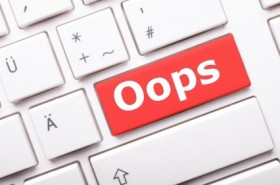Hilary Clinton used a personal email account rather than her White House one. Now 10 Downing Street admits to automatically deleting its emails after 90 days. As a result some are suggesting that instant electronic messaging systems which self-destruct are the solution like SnapChat and Slack. But are they?
For any technology to succeed and add value to the business, requires that users are properly trained. Sadly though, normally 80% of our time and budget is spent on the technology and its implementation and only 20% on providing the user with adequate skills to use it properly.
How many of you have ever been educated to mange your use of email, little own deploy good email etiquette which would reduce the need to email ping-pong and email gaffs. In Mesmo Consultancy’s experiences it is less that 20%. So little wonder we often find ourselves confronted with consequences of an email we wish we had never sent.

Email disasters
It is naive to think that we can delete an email. Once sent it is there for ever, either stored on a server as News International and Sony Corporation found to their dismay, or still in the recipient’s inbox. Far better is to adopt slow and quiet email. Think before hitting send. Reflect and ask yourself ‘what if someone found this email’.
Without proper training and a change in organisational culture instant electronic messaging communications systems (like Slack and SnapChat) will be doomed to the same failure and disasters as our current version of email.
Need help to change your email culture to make it work for, rather than against you? Call Mesmo Consultancy to hear how our email training has has helped others. Alternatively, watch our video on email etiquette.
Tags: 10 Downing Street, Deleting emails, email culture, email etiquette training, Email gaffs, Email ping-pong, Email training, Hilary Clinton, Mesmo Consultancy, News International, Slack, SnapChat, Sony Corporation
Saying ‘thank you’ is about both the medium and the content as David Tang wrote in the Financial Times last week. A point I whole heartily endorse. It is about conveying sincerity and it is better to send an email than do nothing. If you choose to use email what is the best email etiquette to demonstrate sincerity?
Here are some tips.

BomoArt Note Card
informative. The day spent at was ……
Call me old fashioned, (but as discussed previously) for my part I still prefer to send a conventional hand written note to express my gratitude, when someone has gone the extra mile. And of course I am lucky having BomoArt as my sponsor who provide me with the exquisite cards to do so. That said, there is something about taking the time to buy a card that adds depth to the thank you.
However, in this day and age when first, many people are time poor and second, many cannot write properly and rely wholly on electronic devices, hopefully good email etiquette will help convey sincerity.
These are some of the aspects covered in Mesmo Consultancy’s Brilliant Email etiquette training masterclasses.
Tags: corporate email etiquette, email etiquette, email etiquette training, thank you emails
Make your job application stand out in a crowded recruiter’s inbox – why and how.
Tags: email etiquette, email etiquette dos and don'ts, email etiquette training
Today’s interview with Geoff Carter is on email etiquette – key dos and don’ts to protect your e-dress code (and especially in the light of the recent Barclays ‘Hey Dude’ emails).
Some useful links are:
Email etiquette goes a long way
 Lessons in email etiquette
Lessons in email etiquette
Seductive email needs discipline
Email etiquette checklist
So you think you deleted the email
Could your business benefit from some email best practice training? If so please contact us about our Brilliant Email Master Classes. These have been proven to help people save up to one hour a day and reduce the risk of you and your company starring in the next email media disaster.
Tags: corporate email etiquette, email etiquette dos and don'ts, email etiquette rules, email etiquette training
When will everyone understand that email and social media communications never disappear into the ether? And why don’t we realise that our emails provide an instant and probably permanent picture of us, our culture and our business office? Good email etiquette is as vital as managing the risk of a breach of security and compliance as discussed recently on the BBC Today programme.
Today, even if we delete an incriminating email or one we’d rather forget – it will still be sitting on some server somewhere or in a ‘cloud’ waiting to rain down disaster at any time up to decades later.
This is particularly the case if your company is linked to the financial, legal, public or professional services world. We all have to keep records for a minimum of six years and in regulated environments like finance and commerce, communications are often retained for ….ever and can be requested as evidence.
Sadly, history keeps repeating itself as I’ve been writing for over a decade about extremely avoidable ‘emailgate’ type disasters. From ‘Govegate’, to Microsoft antitrust, Merrill Lynch, Norwich Union (in 1977), BP emails revealing lying about the oil leakage and putting cost cutting before safety, to the recent memorable and revealing emails and texts exchanged by executives, editors, MPs and even prime ministers called to appear at the Leveson inquiry into phone hacking at the News of the World. But top of the mind is Barclays, the latest large corporate brought down by inappropriate use of email.
 |
“Dude, I owe you big time! Come over one day after work and I’m opening a bottle of Bollinger,” was seductive and highly conversational. Not really the terms and phrases you’d expect for something so important and highly sensitive as fixing the interbank lending rates. Indeed Traders made their requests in person, via email and through electronic “chats” over an instant messaging system with little concern about the content, tone or image they were leaving behind.
And that’s the point. Neither they or their organisation probably ever considered that their words would or could be broadcast worldwide several years after they were written. Even if they had deleted the communications they would still exist somewhere and could be retrieved. The damage caused by casual communication is not just to the image of the individuals involved but can take years and large amounts of funds to rebuild the confidence of customers and the markets in which they operate.
What Barclays did was wrong. Poor use of email and email etiquette just made the evidence easier to find. Perhaps it’s time for ‘slow email’ and more guidance on how email is used in the decision making process?
Tags: corporate email etiquette, email best practice, email etiquette dos and don'ts, email etiquette rules, email etiquette training